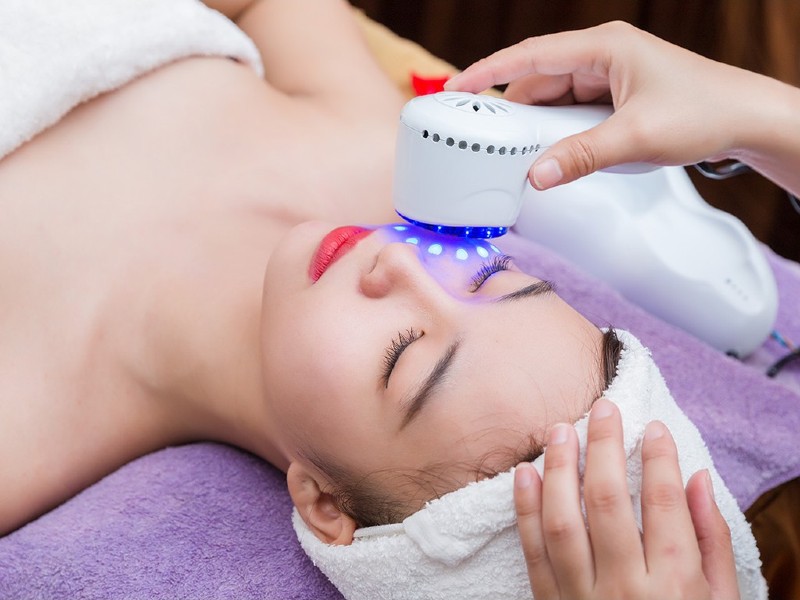There are various ways to supply the skin with vitamin C, including dietary intake, supplements, and cosmetic products. Among these, vitamin C electrophoresis stands out as a technique to enhance skin health, promoting a healthy, radiant, and smooth complexion from within. Let’s explore the effects of vitamin C electrophoresis in this article.
Understanding Vitamin C Electrophoresis
The Significance of Vitamin C for Skin
Vitamin C is a highly beneficial nutrient for the body, particularly the skin. This water-soluble vitamin, also known as ascorbic acid, plays a crucial role in various skin-related aspects. It is renowned for its anti-inflammatory properties, collagen-boosting effects, skin brightening capabilities, and its ability to fade dark spots.

Vitamin C offers numerous beneficial effects to the body, particularly for the skin.
Following the doctor’s advice, it’s important to regularly incorporate vitamin C into your diet, especially during periods of fatigue and stress. Ensure that vitamin C is a part of your daily dietary intake and skincare regimen to promote overall well-being.
Vitamin C Electrophoresis
Vitamin C electrophoresis, also known as vitamin ion electrophoresis, is a modern technique that employs electromagnetic waves to facilitate the deep penetration of vitamin C-rich essences into the skin. This method ensures that vitamin C reaches the epidermis, promoting collagen and elastin production, skin rejuvenation, and the prevention of acne scarring.
While vitamin C can be sourced from fruits (e.g., lemons, tangerines, oranges) and green vegetables (such as broccoli and spinach), it’s important to note that this source of vitamin C doesn’t remain in the body for an extended period. Therefore, vitamin C electrophoresis plays a key role in maintaining the necessary levels of vitamin C to combat oxidation and uphold healthy and beautiful skin.

Vitamin C electrophoresis carries the essence deep into the epidermis.
What are the benefits of vitamin C electrophoresis?
Vitamin C electrophoresis offers numerous benefits, some of which are highlighted below.
Melasma and Freckle Reduction
Vitamin C electrophoresis effectively reduces the appearance of melasma and freckles. These skin issues can impact one’s self-esteem and confidence, particularly among women. The introduction of vitamin C into the skin helps inhibit excessive melanin production, thereby diminishing melasma, freckles, and even acne scars. This results in brighter, more even-toned, and visibly translucent skin, ultimately boosting one’s self-assurance in various aspects of life.

Vitamin C electrophoresis diminishes pigmentation and freckles on the skin.
Stimulates Collagen and Elastin Production
In addition to its efficacy in reducing melasma and freckles, vitamin C electrophoresis promotes healthier and more radiant skin. The vitamin C ions in the treatment act as catalysts, stimulating collagen production, which in turn helps to fill in fine lines and create smoother skin.
Scientific studies have demonstrated that exposure to vitamin C leads to collagen regeneration rates up to 8 times faster than normal. Consequently, acne scars and crow’s feet gradually fade, making way for smoother skin.
Slows Down Skin Oxidation
Another notable benefit of this method is its anti-aging effect. Vitamin C electrophoresis targets chromosome chains, slowing down the oxidation process and reducing sebum secretion. After undergoing vitamin C electrophoresis, the skin will appear revitalized and full of life.

Electrophoresis results in brighter, smoother, and rosier skin while also preventing oxidation.
Protects the Skin from UV Rays
You may not be aware, but vitamin C is regarded as a highly effective natural sunscreen for the skin. Vitamin C aids in preventing sunburn, post-sun redness, and minimizes the risk of skin cancer. Therefore, when combined with sunscreen, vitamin C electrophoresis provides a dual-layer protection for the skin, guarding against the harmful effects of the sun.

Vitamin C electrophoresis shields the skin from the sun.
When the epidermis contains an adequate amount of vitamin C, in combination with vitamin E and amino acids – antioxidants, it helps neutralize free radicals, thus preventing skin aging induced by sun exposure.
Side Effects of Vitamin C Electrophoresis
While highly effective, improper use of this method may lead to certain conditions, including:
- Women may experience increased redness and skin irritation.
- Initially, some individuals may also feel a tingling sensation.
- In some cases, customers may develop muscle tension and experience headaches due to the impact of electrophoresis.

Your skin might appear red after undergoing vitamin C electrophoresis.
Hence, it is advisable to consider the following do’s and don’ts of this modern skincare technology before using it.
Cases for and against vitamin C electrophoresis
Who SHOULD get vitamin C electrophoresis?
The benefits of vitamin C electrophoresis are most apparent for the following individuals:
- Individuals with uneven skin tone and multiple acne scars: Uneven skin tone can result from various factors, but it often leads to patchy and irregular skin. Therefore, individuals with such issues should consider vitamin C electrophoresis.
- Sunburned skin, melasma, and freckles: As mentioned earlier, vitamin C helps reduce melanin production, which can effectively fade dark spots, melasma, and freckles.
- People with enlarged pores: Large pores can lead to various skin problems, and vitamin C can help combat inflammation associated with pores.
- Individuals with numerous acne scars or fine wrinkles.

Individuals with minor freckles and melasma should consider undergoing vitamin C electrophoresis.
Additionally, vitamin C electrophoresis can benefit anyone seeking routine skincare, both men and women, to maintain healthy and beautiful skin.
Cases where vitamin C electrophoresis should NOT be performed
However, vitamin C electrophoresis is NOT suitable for everyone, including the following cases:
- Allergy to vitamin C: If you are allergic to vitamin C or any other nutrients, it’s important to avoid using such products as they can lead to undesirable complications.
- Individuals with cardiovascular disease or epilepsy.
- People diagnosed with skin cancer: Cancer is a serious medical condition that should be treated under the supervision of a qualified healthcare professional. It’s best not to introduce any substances into the skin to prevent potential complications.
Procedure for Performing Vitamin C Electrophoresis
The process of performing vitamin C electrophoresis is relatively straightforward, but there may be variations depending on the specific location. In general, vitamin C electrophoresis is carried out as follows:
- Step 1: Skin evaluation and examination are conducted by the doctor or staff to assess the individual’s skin condition. Based on this assessment, the doctor determines the appropriate amount of vitamin C for each person.
- Step 2: Makeup is removed, followed by exfoliation to eliminate the dead skin cells. A cleanser is then used to clean the skin thoroughly, enhancing the absorption of nutrients into the skin.
- Step 3: Steam is applied to open the pores, helping to remove excess oil and dirt from the skin.
- Step 4: Perform a facial massage to enhance blood circulation.
- Step 5: Apply a facial mask, followed by using a warm towel to gently cleanse the skin.
- Step 6: Employ an electrophoresis device to facilitate the penetration of vitamin C deep into the epidermis, promoting skin regeneration and enhancement.
- Step 7: Apply lotion and allow the skin to relax.
- Step 8: The staff provides guidance on at-home skin care following vitamin C electrophoresis.
Questions about vitamin C electrophoresis
How long does a typical vitamin C electrophoresis session take?
The duration of this method is a common concern among many individuals. Normally, according to experts, a single electrophoresis session takes approximately 15 minutes. However, this timeframe is not universal and may vary based on the individual’s skin area and location.

Typically, vitamin C electrophoresis sessions last around 10-15 minutes.
How frequently should electrophoresis be performed?
The frequency of electrophoresis sessions depends on your specific skin condition and location. If your skin has fewer imperfections, the treatment duration will be shorter, and you can achieve bright, smooth, and rosy skin more easily.
For the most effective results with vitamin C electrophoresis, it is recommended to undergo 3-5 sessions. Each session usually lasts around 10-15 minutes, so time constraints are not a significant concern for customers.
How long do the effects of vitamin C electrophoresis last?
To maintain the long-term results of vitamin C electrophoresis on your skin, it’s advisable to periodically undergo repeated electrophoresis sessions. These sessions should be spaced approximately 2 weeks apart, ensuring that vitamin C penetrates the skin effectively and provides its full benefits. If you have any questions or wish to change your electrophoresis routine, consult with your doctor for further guidance.
Can vitamin C electrophoresis lead to sunburn?
After undergoing vitamin C electrophoresis, some customers may be concerned about the risk of sunburn or skin irritation. However, vitamin C is primarily aimed at brightening the skin, preventing skin aging, and shielding the skin from environmental effects. Therefore, you can be confident that electrophoresis with vitamin C will not result in sunburn.

Vitamin C electrophoresis does not lead to sunburn.
For some women who experience adverse reactions to this technology, their skin may become more irritated and appear redder. In such cases, it is advisable to consult with a dermatologist or take extra care of your skin at home to ensure proper protection.
Should I undergo electrophoresis if I have inflammatory acne?
The answer to this question is no. The skin during an inflammatory acne episode is particularly sensitive. Applying vitamin C essences to such skin can easily lead to inflammation and irritation. It is recommended to address your acne condition comprehensively and only consider using vitamin C electrophoresis technology once your skin has improved and stabilized, enabling you to achieve a more radiant and healthy complexion.
Consider the following points when undergoing vitamin C electrophoresis
- Potential side effects: Be aware that your skin may experience side effects like irritation, stinging, headaches, or tightness in the treated area after vitamin C electrophoresis.
- Avoid bleaching products: Refrain from using bleaching products immediately after the treatment. A white film of vitamin C will remain on your skin for several hours, and washing your face right after the procedure may reduce the effectiveness of vitamin C electrophoresis.
- Consistency is key: To achieve the best results, it’s essential to be patient and adhere to the recommended treatment course. Regular sessions, coupled with at-home skincare, will help maximize the benefits.
- Understand the limitations: While vitamin C electrophoresis offers various skin benefits, it’s not a treatment for skin diseases and cannot replace intensive therapies. For specific skin issues like melasma, freckles, acne scars, or dark spots, seek out dedicated treatment options for comprehensive care.

Do not use any whitening products immediately after electrophoresis.
In summary, vitamin C electrophoresis plays a supportive role in skin rejuvenation and is often incorporated into various beauty treatments to enhance overall skin health.

Johnny Jacks was born in 1985 in Texas, USA. He is the founder of Good Health Plan and is passionate about helping people improve their health and physical well-being. With over a decade of experience working in the healthcare industry, he currently works at Goodheathplan.com – a blog that shares knowledge on beauty and health.
